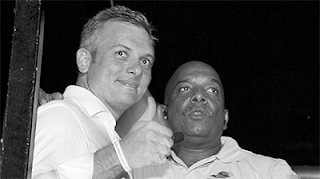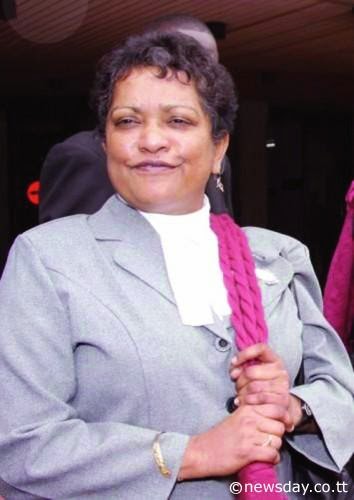News Watch :Curaçao’s big man shot dead
Curaçao’s big man shot dead
...Why? And what’s next?
Published:
Sunday, May 12, 2013
Around five o’clock last Sunday afternoon, Helmin Wiels bought fish on Marie Pampoen beach in Curaçao. Before he could pocket his change, a gunman fired five times. Hit in the back, he died fast. Wiels was leader of Pueblo Soberano, the largest party in Curaçao’s Parliament, with five of the 21 seats. Aged 54, he had been in politics for ten years, after a career in social work. Ronald Plasterk, the Dutch minister who handles relations with the island, last week called him “the most powerful man in Curaçao.”
He was a fierce campaigner against corruption, with strong grassroots support and a weekly radio slot. He railed also against other targets—political opponents, Dutch expats, alleged mafia members, drug dealers, and the US counter-narcotics planes at Hato Airport. A regular presence at early morning mass in the Catholic cathedral, Wiels did not spare his church. Three days before his death, he said that he intended to expose alleged illegalities linked to the use of text messages for the sale of lottery tickets.
The murder left the country stunned. The streets went dead at nightfall. A small crowd applauded the dead man as his body left the beach under police escort. Some wept. Supporters lit candles. A sad bunch of flowers marked the killing site. Why was Helmin Weils killed? The non-party Prime Minister, Daniel Hodge is cautious. He told Dutch journalists: “There are a lot of speculations. I cannot join them.” But he added, “Probably it has to do with the statements of Mr Wiels in the past period.”
Two brothers, aged 19 and 27, were arrested on Tuesday. They had uploaded a YouTube video which threatened more deaths (don’t bother to look: it’s mostly a black screen, with a soundtrack in the local language, Papiamento).
It is not clear that they are the assassins. The killing looks like a long-planned professional job. It was fast and efficient, with no collateral damage from stray bullets. The murderers knew Wiels’ movements. They picked a Sunday, the day he dropped his bodyguards. Buying fish at Marie Pampoen was a weekly routine.
The police are not saying much. Two dozen witnesses were on the beach—but most are not talking. An accomplice drove off with the shooter in a gold-coloured car. It has not been traced. Some look for clues in a number-play with four fives—five o’clock on May 5, with five bullets.
Curaçao is a pretty little island, 40 miles off the coast of Venezuela. Its clear waters, sunny climate and the bustling historic city of Willemstad pulled more than 400,000 tourists last year. The other money-spinner is an oil refinery, leased to Venezuela’s PdVSA. October 2010 marked a bright new dawn. Curaçao won self-government, or status aparte as one of four theoretically equal constituents of the Kingdom of the Netherlands, alongside Aruba, the Dutch half of St Maarten, and the European Netherlands. A Dutch relief package cleared most of Curaçao’s debts.
At first glance, all looks well. But the killing spotlights unstable politics, shaky public finances, large-scale drug crime and corruption. In the Netherlands tradition of proportional representation, any party with more than 5 per cent of the national vote gets a seat. Then the fun starts, as rivals jockey for power.
In 2010, Wiels’ Pueblo Soberano joined a ruling coalition with two other parties. The new prime minister, 36-year-old Gerrit Schotte, was a dashing but controversial figure with a Colombian mother, and ethnically one of Curaçao’s white minority.
There were concerns when his government disbanded the national security service, which gathered data on organised crime and the drug trade. Nobody was entirely sure what happened to its files. There was controversy over a proposed appointment to the central bank.
Last year, two members of Parliament crossed the floor. Fearing a no-confidence vote, the Speaker did not convene the House. To resolve the crisis, a temporary non-political Cabinet was appointed, with fresh elections called for October. After the poll, Wiels dumped Schotte to form a new coalition with 11 of the 21 seats. A further reshuffle is due. The long-suffering Hodge wants to step down from his post as soon he can.
In spite of the Dutch 2010 bailout, public finances are a mess. The central bank said last year that it had lost track of government debt. In July, the Kingdom Council, where Caribbean representatives sit with the Dutch Cabinet, formally instructed Curaçao to balance its budget.
In today’s Curaçao, the dread word is Mafia. The US State Department reported in March that fishing boats from Colombia and Venezuela bring cocaine destined for the USA and Europe, adding that Curaçao lacks the capacity to “address endemic drug-related crime, violence, and corruption.” Last December, armed bandits dressed as police raided a messy Guyanese fishing boat moored in Curaçao. They seized US$11.5 million in gold. Seven suspects were later held. Some of the gold was recovered in Puerto Rico.
Like Wiels’ death, that crime remains a mystery.
(From The Trinidad Guardian, Sunday, May 12th. May 2013)




Comments